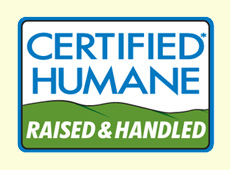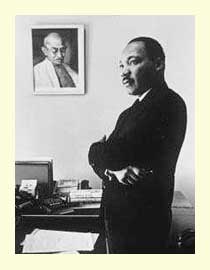In a time of universal deceit, telling the truth is a revolutionary act.
--George Orwell
|
Compassion for Sale?
Doublethink Meets Doublefeel as "Happy Meat" Comes of Age
| In a time not so long from now, practicing compassion will for many come to mean buying and eating "happy meat," a purported win-win-win for the animals, the industry and its customers... |
|
Source: SATYA MAGAZINE by James LaVeck Sep 2006
Click here for direct link to source
|
Last fall, an intelligent, socially conscious, and compassionate person told me that after seeing a Tribe of Heart documentary at a local film festival, she had made a commitment not to participate in animal cruelty anymore. From now on she would only purchase "happy meat" at Whole Foods Market.
Something about these words, offered with sincere appreciation for the work I do as an activist filmmaker, was deeply troubling. I knew they were part of a trend I'd been seeing build amongst audiences over the last few months. The same films that had once inspired large numbers of people to completely reconsider their participation in the exploitation of animals were now triggering something new, an enthusiasm for the moral advantages of "humane" meat. I began to think about how this had come to be, and why the implications seemed to loom so large.
...
It's all about how the farmed animal issue is being reframed: the only real problem with eating animals, we will tell the public, is the abuse inherent in factory farming. Therefore, the argument runs, the solution is production, distribution and consumption of "happy meat." In this brave new world, a mechanized system designed to move animals quickly and efficiently, to take their lives, to drain their blood, and to cut them into pieces on a scale never before imagined, is proudly described as a "stairway to heaven" by a slaughterhouse designer well on the way to attaining celebrity status. And no one blinks, not even those who hold in their hearts a dream of a world without violence. Such is the hypnotic effect of distorted language and PR razzle dazzle.
It is happening now, before our eyes. The moral value of the word "compassion," infused for decades with the altruism and integrity of countless grassroots activists and educators, is in the process of being converted into cash. Compassion will now mean killing more softly, an exciting new brand associated with products delivered with the promise of a precisely regulated and approved amount of suffering. In a time not so long from now, practicing compassion will for many come to mean buying and eating happy meat, a purported win-win-win for the animals, the industry and its customers.
And given their track record of deception and an increasingly skeptical public, how will the animal exploiting industries assure their customers that happy meat is indeed truly happy, and that nothing could be more compassionate than buying it? They will create committees, foundations, and blue ribbon commissions charged with developing detailed standards as to how the deed will be done. They will adorn these cross-disciplinary teams  with the credibility of people and organizations that have given decades to the cause of freeing animals from exploitation. And finally, on the fleshy products that result from this pageantry, they will affix new labels emblazoned with terms such as "Certified Humane," "Animal Compassionate," "Freedom Food," "Animal Friendly," or "Cruelty-Free."
with the credibility of people and organizations that have given decades to the cause of freeing animals from exploitation. And finally, on the fleshy products that result from this pageantry, they will affix new labels emblazoned with terms such as "Certified Humane," "Animal Compassionate," "Freedom Food," "Animal Friendly," or "Cruelty-Free."
By extracting from the public a modest conscience tax in the form of higher prices for goods bearing the requisite label, those who make millions trading in animal parts will watch the price of their corporation's stock rise. And participating animal advocacy organizations will be sorely tempted to publicly declare victory after victory as each new standard is put in place, reaping copious rewards for seeming to reconcile the inherent contradiction between the enjoyment of flesh and the pain we do-gooders feel over exploitation of the animals.
...
Case in point: John Mackey, CEO of Whole Foods, and founder of the Whole Foods-sponsored Animal Compassion Foundation, developer and purveyor of new "compassionate standards" for the exploitation of animals. In a 2005 conference speech, Mr. Mackey declared that "our mission and responsibility is to help the whole planet -- including people, animals and the environment -- to flourish and reach their optimum state of physical and ecological health." Moments later, he said, "We also now recognize that farm animals are environmental stakeholders… just like the environment as a whole cannot speak for itself, neither can the farm animals speak for themselves. So it's important that we have the empathy to act in their best interests." (Emphasis added.)
It all sounds so good and so right. But the Orwellian underbelly of Mr. Mackey's world was revealed when an audience member asked him why his company still sells veal, presumably wondering how taking a calf from his mother and butchering him to be packaged and sold in a Whole Foods market could, under any system of rational thought, be fairly characterized as helping that animal achieve an "optimum state of physical and ecological health" or as acting in that individual's "best interests." 
"If it's a crime to kill an adult cow," Mr. Mackey offered up as a response, "it's a crime to kill a baby calf. I mean, the same argument could be made for lamb or anything else. I mean, Whole Foods is a grocery store, and our customers want to -- they want to buy dead animals."
Precisely.
So let us call things by their true names. If Mr. Mackey and his Animal Compassion Foundation are going to march under the banner of compassion, let us be clear that it is, as someone wryly noted, a "cutthroat compassion."
Given Mr. Mackey's professed education in the field of philosophy, it is hard to believe that the logical absurdities he asks us to accept are the naive errors of an untrained mind. Rather, as a relentlessly successful businessman, he seems to have found a new and creative way to sharpen his competitive edge. "Cause-based marketing" is the method in play, and in this case, success is achieved not by actually practicing compassion toward animals, not by acting in their best interests, but by methodically generating the appearance of doing so, as that is what keeps the customers coming, the protesters at bay, and the stock price climbing ever higher.
As another quick-witted observer pointed out, just as the third wave of environmentalism was characterized by "greenwashing," it seems that animal advocacy's third wave is destined to bring us "hogwashing"--the practice of generating the public appearance of having compassion for animals while continuing to kill millions of them for profit.
...
By standing by and remaining silent as those who have a financial interest in the exploitation of animals first appropriate and then redefine the very language that expresses the deepest principles that inspire and guide our work, we are surely giving away our power and identity in a way that is going to be very hard to regain.
And, as our language loses its integrity, our ability to think critically and to engage in meaningful dialogue is going to decline as well, as will our cohesiveness as a community, our love of the work, and the joy we take from the process of supporting peaceful change.
But we don't have to travel any further down this crooked road. There are other choices more direct. Delving into the lives and work of those such as Gandhi and King, we can see that being practical is not incompatible with being idealistic. Both were constantly faced with pressure to compromise their core principles in return for short-term gains that were desperately needed by those they served.  Yet, neither of these brilliant leaders chose to give in to such pressure, nor did remaining true to their principles mean accepting second-class results.
Yet, neither of these brilliant leaders chose to give in to such pressure, nor did remaining true to their principles mean accepting second-class results.
Instead, they got outside the box, synthesizing old school values with radical social creativity. They transformed their societies by openly sharing the deepest truth they knew, in the most direct language possible, without compromise, without dilution. And, notably, they avoided conflicts of interest at all costs. Indeed, their staunch refusal to cooperate with or participate in the mechanisms of exploitation provided the very clarity and strength that propelled them to victory.
In doing so, Gandhi and King inspired millions to keep their eyes on the prize, not just in their own times, but for all time. Not just for those who shared their causes, but for those who care about any cause. And they did it all with a level of spirited boldness that still takes our breath away.
To make good for the long haul, each of us must consider the possibility that our choices, however well motivated, may have unintended consequences none of us desire. Success in the monumental work we have taken on will only come when our vision of a transformed world is brought into harmony with the means we use to make that vision come to life. This is not easy to achieve, but it has been done before, and it can be done again. To do otherwise is to ignore much of what has been learned in the last century about the true nature of the interdependent, interconnected world in which we live. Whether you talk to a historian, a psychologist, a philosopher, or an indigenous elder sitting on a mountaintop, the message is the same. Whatever methods we use to change the world will, in strong measure, come to define the character of who we become, and the nature of the new society we create. It is, essentially, a law of the universe.
...
Compassion is the highest expression of human potential. As such, it can never be bought or sold, only freely given and received. Using this word as a label for the products of suffering and exploitation is nothing short of an act of violence.

